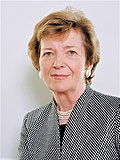History
Established in 1986, the award is given to an individual who has "accomplished work of extraordinary distinction in the field of public health or made a specific discovery or contribution that has had long-term national or global implications in such areas as communicable disease, environmental health, epidemiology, social and/or behavioral medicine, health policy, or any aspect of health promotion or disease prevention." [3]
The prize is named after Dr. Frank A. Calderone, who after serving as the first deputy health commissioner of New York City from 1943 to 1946, became a leading figure in the World Health Organization (WHO) during its formative years. In 1947, under Dr. Calderone's direction as Medical Administrator at the headquarters of the World Health Organization, the newly-formed organization led a successful global cholera vaccination program. [4] The following year, as the WHO grew to include 58 member countries, Dr. Calderone became the organization's Chief Technical Liaison Officer. He was later appointed as Medical Director of the health service of the United Nations Secretariat, a position which he held from 1951 to 1954. [5]
This page is based on this
Wikipedia article Text is available under the
CC BY-SA 4.0 license; additional terms may apply.
Images, videos and audio are available under their respective licenses.
















